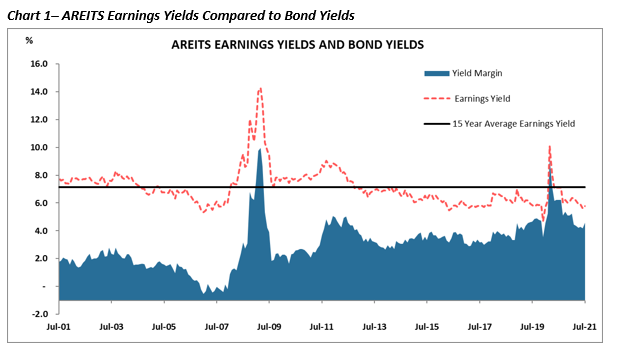By Chris Owens, Analyst, Atchison Consultants
Australian real estate investment trusts (AREITs), as represented by the S&P/ASX 200 AREIT Index, returned
0.3% in the month ending 31 July 2021. The AREIT index underperformed the S&P/ASX 200 return of 1.1% over the month.
Over the 12 months to July 2021, AREITs posted a total return of 32.8%, outperforming the S&P/ASX 200 return of 28.6%. Recovery from the depths of falls in 2020 prompted by the pandemic is reflected in this performance.
Sector Performance
Table 1 below shows the performance of AREITs for various periods ending 31 July 2021.
Over the 3 years and 5 years to the end of July, the sector produced total returns of 7.5% and 4.7% per annum respectively.
Sector returns in July from Industrial AREITs were strong at 6.7%. Diversified AREITs returned -1.7%, followed by Retail AREITs with -2.3% and Office AREITs with -2.5%.
Table 2 below shows the income performance of AREITs for various periods ending 31 July 2021.
The income component of the total return was 3.7% for the 12-month period to July 2021. Annual volatility of income returns was 1.9%, which is low when compared with other asset classes.
AREITs were trading at an earnings yield of approximately 5.8%, significantly higher than yields of both cash and Commonwealth Government bonds. The spread of the earnings yield over the 10-year government bond yield increased to 4.6%.
Changes over time of the spread between the earnings yield of AREITs and the 10-year government bond yield are shown in Chart 1.
Market Review
Despite repeated lockdowns and a shift in consumer spending to online, retail landlords have managed to post strong profits this reporting season.
Scentre Group, the owner of 42 Westfield malls, posted a 28% rise in 2021 half-year earnings to $463 million. CEO Peter Allen expects online shopping to revert to pre-pandemic levels and is confident foot traffic in malls will surge once vaccination targets are hit and lockdowns are eased.
Landlord GPT announced a 24% increase in earnings, through a rebound in retail rent collection. Shopping malls represents the largest share of GPT earnings, where revenue rose 78% to $141 million.
Shopping centre giant, Vicinity, while reporting a net loss of $258 million, managed to climb back from its 2020 $1.8 billion loss.
While Scentre Group remains positive on the outlook for shopping malls, GPT and Vicinity are hedging their bets and continue to diversify into other property segments.
Vicinity plans to develop a 25-storey office tower in Melbourne’s Box Hill, as well as a 48-storey residential building. These will add $2 billion to the current $26 billion portfolio.
GPT plans to increase industrial holdings from 23% to 30%. GPT saw an 11% valuation gain in its industrial portfolio in the first half of this year.




